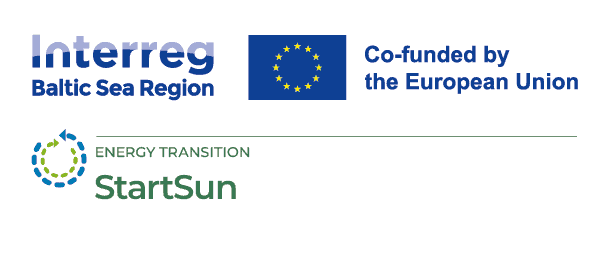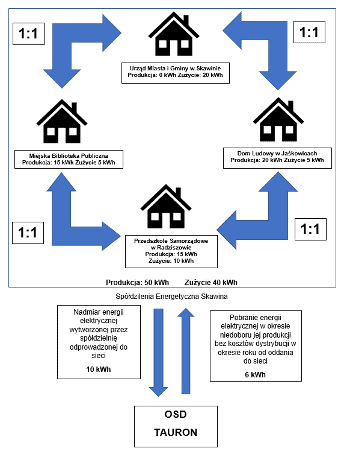
Case Study #10: Skawina (Poland)
08 October 2024
Author: Grzegorz Horwacik and Green Liberty
Keywords: Energy cooperative, public authorities, net metering
Overview
The Skawina Energy Cooperative (Spółdzielnia Energetyczna Skawina-SES) was established in 2023. Skawina is a town in southern Poland. The members of the energy cooperative are legal entities providing public services to the local community: the Skawina Commune, the Municipal Public Library in Skawina, and the Regional Museum in Skawina. The cooperative was established to meet the energy needs of public buildings. Since May 2023, it has operated four solar photovoltaic installations, totaling 0.06 MW. There are more than 30 energy cooperatives in Poland, with a total installed capacity amounting to just over 5.1 MW.
Legal form
There are more than 30 energy cooperatives in Poland, and one of them has been established in Skawina. It operates on the same principles as other cooperatives in the country, but there are additional aspects listed in the dedicated Act on Renewable Energy Sources, regulating this area in Poland since 2016. The act stipulates that the cooperatives can be established in a rural or an urban-rural setting; also, the members of the cooperative are natural persons or public bodies from the municipalities. There are also specific conditions for energy generation and consumption:
“They must produce electricity, heat or gas (from a biogas plant) using renewable energy sources, and balance energy demand among their members. At the same time, they must cover at least 40% of the annual energy or heat demand of their members from renewable energy sources. The size of their installation is limited to 10 MW in the case of electricity production, 30 MW in the case of heat generation and 40 million m3 in the case of biogas”.
There are several other forms of energy communities such as energy clusters, virtual prosumers, or collective prosumers. However, after the first year of its operation, there is no plan to change the legal status of the Skawina Energy Cooperative.
Technological setup
The energy cooperative employs photovoltaic installations on the roofs of public buildings. It is also planned to extend the cooperative with small hydroelectric power plants and small local biogas plants. The installations will be connected to the national energy system via the local low voltage line. Each unit is connected individually to the
low voltage line.
It rather long for the Skawina Energy Cooperative complete all agreements with the energy company regarding preferential settlements granted by its legal form in Poland.
Governance
The roles and duties of members are described in the statute of the Skawina Energy Cooperative. The energy settlement system and its rules will be described in dedicated agreements between the members and the cooperative. The Skawina Energy Cooperative is a separate legal entity controlled by a management board. The board is elected by a supervisory board appointed by the members. A member of the Skawina Energy Cooperative may leave the cooperative. All members are responsible for the technical maintenance of the project.
Business model
The Skawina Energy Cooperative was established primarily to stabilize the cost of electricity for its members. The project is highly feasible. The recipients of the generated energy are primarily the buildings on which the installations are located, as well as other public buildings included in the energy cooperative. Pursuant to the provisions of Polish law, the Skawina Energy Cooperative does not primarily purchase energy. Instead, it settles accounts based on the number of kilowatt-hours of energy delivered to and received by its members. Only when there is insufficient energy in the cooperative’s resources does it require additional energy, according to specifications agreed upon with the energy company.
Poland has a very large number of active customers with small solar PV installations – more than 1.4 million micro-installations exceeding 11.3 GW. Until recently, the state provided an additional economic stimulus via the net metering system. However, it was changed to the net billing system in the summer 2024. Although energy cooperatives cannot sell the excess electricity to other participants of the electricity market, they can collectively benefit from reduced costs of using the common system:
“Energy produced by energy cooperatives is much cheaper because it is not subject to capacity fees, renewable energy fees, cogeneration fees or other variable distribution fees. Moreover, energy cooperatives remain the only entities that still can settle their bills based on net-metering, providing a significant advantage to participants when compared to prosumer installations.”
The cooperative and its members do not bear distribution costs for transporting electricity between members at a given hour. In the event of excess energy production about its consumption in a given hour, the excess electricity discharged to the grid may be collected in the amount of 60% of the delivered kWh within a year from the date of its delivery.
The Skawina Energy Cooperative is, in a way, a public entity because only such entities are its members. There is no option of dividing the obtained revenues among its members. They are used to cover current costs and investment costs. In spring 2024, electricity costs in Poland were guaranteed at PLN 0.785 net per MWh of electricity.
Digital tools
Skawina Energy Cooperative does not currently use local energy management systems. It uses the system to settle and balance energy production and its consumption at individual energy consumption points.
The DSO in Poland installs bidirectional meters in the building that record the amount of energy fed into the grid and the amount of energy received. The level of data privacy cannot be high due to the public nature of the data as it concerns public buildings. In terms of energy management, the Skawina Energy Cooperative plans to include energy storage facilities and their management systems in buildings where PV installations have been installed.
Social inclusion
Due to the goals of the Skawina Energy Cooperative, it is not planned to include natural persons in it. The Skawina energy cooperative shares its experiences with other local governments and shows the organizational, legal and financial model it has chosen.
Barriers and challenges
When establishing the Skawina Energy Cooperative, legal advice was required during its establishment. Financial barriers were noticeable but not critical. In general, the most common problems are encountered with the DSOs due to their delay in implementing contracts and connecting subsequent installations to the energy system. Additionally, the energy system does not allow for the excess production of electricity during some of the installation’s production periods.
For local politicians, financial criteria are the most important when planning new renewable energy projects. Other criteria for undertaking innovative activities related to energy communities, such as environmental, energy security, and climate goals, are less evident. Research suggests that energy cooperatives in Poland play a minor role in energy security policies:
“However, the role of energy cooperatives can be increased if local authorities get involved in the projects. In this case, communes should support cooperatives already at the investment location stage. It is also important that municipalities can play the role of a key investor, which may be difficult due to the financial problems of Polish local governments. Nevertheless, energy cooperatives may in the future strengthen local socio-economic security and may become a tool in the fight against energy poverty.”
References
Kostecka-Jurczyk, D., M. Struś, and K. Marak. 2024. “The Role of Energy Cooperatives in Ensuring the Energy and Economic Security of Polish Municipalities.” Energies 17, no. 13: 3082. https://doi.org/10.3390/en17133082.
Zablocki, M., J. Orlowska, and P. Chalubinski. 2024. Energising Energy Communities: Transforming Poland’s Power Sector with Locally Owned Renewables. May 2024. https://beyondfossilfuels.org/wp-content/uploads/2024/05/energising-communities-en.pdf.
Urząd Regulacji Energetyki (Office of Energy Regulation). “The Number of RES Micro-Installations in Poland Exceeds 1.4 Million.” Last modified April 14, 2023. https://www.ure.gov.pl/en/communication/news/378,The-number-of-RES-micro-installations-in-Poland-exceeds-14-million.html.






